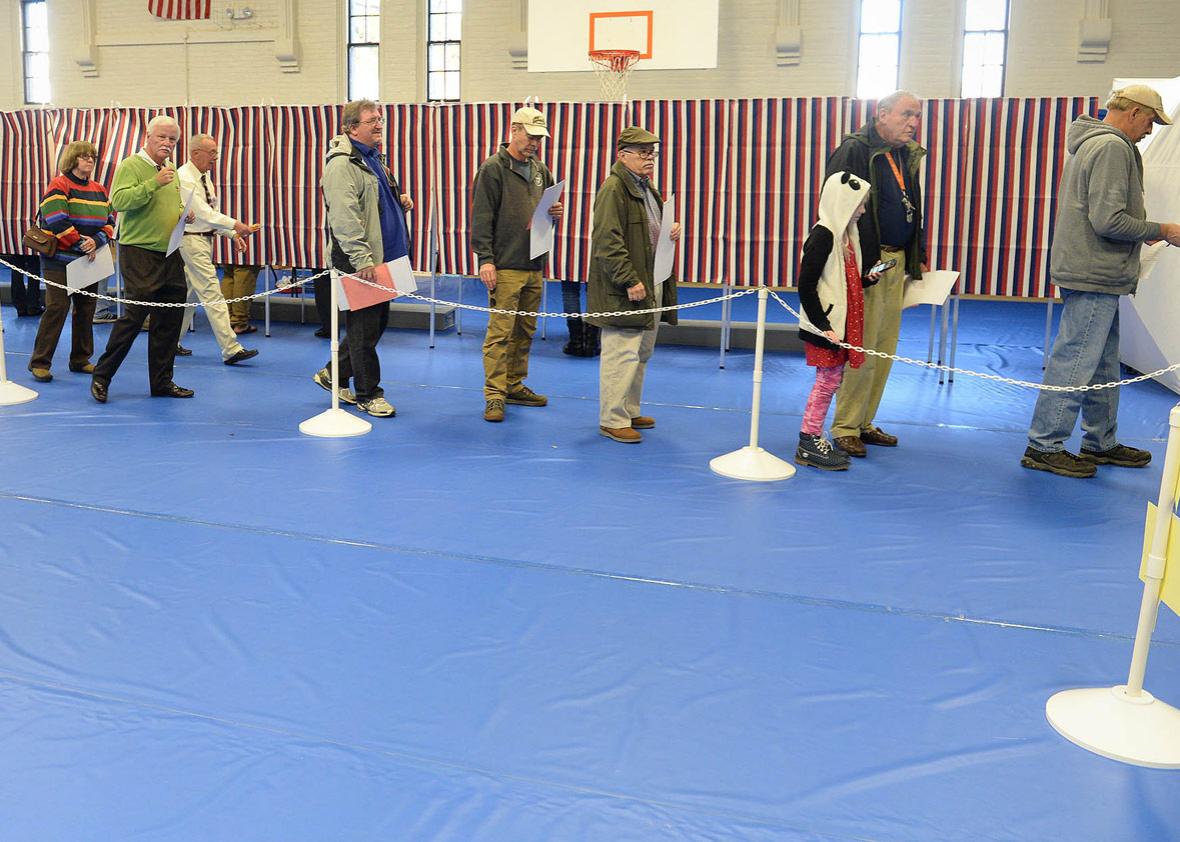This could be a very bad week for voting rights in the United States.
On Friday, a federal consent decree to stop potential voter suppression by the Republican National Committee—in place since 1982—is set to expire unless further extended by a federal district court in New Jersey. What happens next, with Donald Trump in charge of the Republican Party, will likely not be pretty.
In 1981, the Democratic National Committee sued the RNC over its rival’s “ballot security” measures, which the Democrats alleged were aimed at suppressing minority voters. As the district court later explained, the suit alleged that:
[I]n connection with the 1981 New Jersey Gubernatorial election, the RNC and the New Jersey Republican State Committee attempted to intimidate the minority voters, in violation of the Voting Rights Act. Specifically, the RNC sent sample ballots to areas where a large portion of the voters were ethnic minorities, then asked that the name of each voter whose sample ballot was returned as undeliverable be removed from New Jersey’s voter rolls. In addition, in an alleged effort of intimidation, the RNC hired off-duty law enforcement officers to patrol polling places in minority precincts. The officers wore armbands that read: “National Ballot Security Task Force,” and some carried two-way radios and firearms.
Rather than fight the charges, the RNC agreed to settle the case in a “consent decree,” a settlement agreement between the parties that is also embodied in a court order. This has meant that if the RNC violated the agreement, the DNC could seek to hold it in contempt.
Over the years, the RNC has begun to bristle at the consent decree as the court—over the Republican Party’s objections—modified and extended the decree in 1987 and 2009, based in part on findings of new violations. Recently, the RNC has taken all kinds of steps to make sure it has no official programs aimed at combating voter fraud or is doing anything else which could get it in trouble with the court. The current version of the decree is set to expire this Friday, unless further extended by the federal district court in New Jersey that has been handling this case since 1981 (a new judge was assigned last year after the original judge died). The judge has scheduled a phone conference with the lawyers for Wednesday.
During the run-up to the 2016 elections, Democrats sought to have a court find the RNC in contempt based upon actions of the Trump campaign, Trump adviser Roger Stone, and some members of state Republican parties who had supposedly acted to combat the risk of “voter fraud.” The decree itself binds only the national party, not the state parties or individual campaign actors. Just before the election, the court preliminarily found that Trump and these other actors were not acting in concert with the RNC on their potentially suppressive activities but agreed to let the DNC pursue additional discovery after the election to look for instances of the RNC violating the order.
Right now, the DNC and the RNC are fighting over what happens next. A few weeks ago, news emerged that former Trump press secretary Sean Spicer, then working for the RNC, on Election Day entered the fifth floor of Trump Tower, where the Trump campaign’s poll-monitoring operations occurred. As Politico reported, there was a sign in that area that strictly forbade RNC officials from entering in order to prevent any potential violation of the consent decree.
Even though Democrats have brought Spicer’s activities to the court’s attention, this likely won’t be enough. In recent months, the trial court has expressed skepticism that the DNC has enough evidence of the RNC violating the terms of the decree to justify extending the order. Holding anyone under the cloud of contempt is a big deal, and the court, having refused to impute the Trump campaign’s activities to the RNC, is likely to be hard pressed to extend it without new proof of significant violations.
With the consent decree gone, the RNC will for the first time in 35 years be free to begin anew efforts to spur purges of voter rolls and take potentially suppressive ballot security measures in the name of preventing voter fraud. No doubt RNC lawyers would advise against taking these steps, at least for a while, to forestall the DNC from running back to court seeking to have the consent decree reinstated.
But with Trump the real head of the Republican Party these days, it is quite possible he could order a national effort to combat phantom voter fraud, just like he did with his own campaign. Indeed, making false claims about Democratic and minority voter chicanery is a cornerstone of Trump’s divisive agenda. Yelling voter fraud riles up the base, helps with fundraising, and can depress minority voter turnout.
The Trump era has caused voting rights activists to be extra vigilant against efforts to suppress the vote, from Trump’s faux “election integrity” commission to the Department of Justice’s reversal of an Obama-era position against a particular form of voter purging in Ohio. But the removal of the consent decree could supercharge voter suppression efforts, offering Trump the opportunity to hijack the RNC and direct it toward his own efforts to explain away his 3 million voter loss in the American popular vote and rile his base against poor and minority voters.
Those seeking to protect voting rights have already had their work cut out for them in the Trump era. Things could be about to get a whole lot worse.
